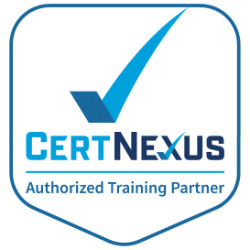
This CyberSec First Responder training course covers network defense and incident response methods, tactics, and procedures are taught in alignment with industry frame works such as NIST 800-61r.2(Computer Security Incident Handling),US-CERT’s NCISP (National Cyber Incident Response Plan), and Presidential Policy Directive (PPD) 41 on Cyber Incident Coordination Policy.It is ideal for candidates who have been tasked with the responsibility of monitoring and detecting security incidents in information systems and networks, and for executing standardized responses to such incidents. The course introduces tools, tactics, and procedures to manage cybersecurity risks, identify various types of common threats, evaluate the organization's security, collect and analyze cybersecurity intelligence and remediate and report incidents as they occur. This course provides a comprehensive methodology for individuals responsible for defending the cybersecurity of their organization.
This course is designed to assist students in preparing for the CertNexus CyberSec First Responder (Exam CFR-310) certification examination. What you learn and practice in this course can be a significant part of your preparation.
In addition, this course and subsequent certification (CFR-310) meets all requirements for personnel requiring DoD directive 8570.01-M position certification baselines:
- CSSP Analyst
- CSSP Infrastructure Support
- CSSP Incident Responder
- CSSP Auditor
Course Objectives:
In this course, you will understand,assess and respond to security threats and operatea system and network security analysis platform.
You will:
- Compare and contrast various threats and classify threat profile
- Explain the purpose and use of attack tools and technique
- Explain the purpose and use of post exploitation tools and tactic
- Explain the purpose and use of social engineering tactic
- Given a scenario, perform ongoing threat landscape research and use data to prepare for incident
- Explain the purpose and characteristics of various data source
Course Objectives(cont.):
- Given a scenario, use appropriate toolsto analyze log
- Given a scenario, use regular expressions to parse log files and locate meaningful data
- Given a scenario, use Windows tools to analyze incidents
- Given a scenario, use Linux-based tools to analyze incidents
- Summarize methods and tools used for malware analysis
- Given a scenario, analyze common indicators of potential compromise
- Explain the importance of best practices in preparation for incident response
- Given a scenario, execute incident response process
- Explain the importance of concepts that are unique to forensic analysis
- Explain general mitigation methods and devices
Lesson 1: Assessment ofInformation Security Risks
Topic A: TheImportance of Risk Management
Topic B: Assess Risk
Topic C: Mitigate Risk
Topic D: Integrating Documentation into Risk Management
Lesson2: Analyzing the Threat Landscape
Topic A: Classify Threats and Threat Profiles
Topic B: Perform Ongoing Threat Research
Lesson 3: Computing and Network Environments: Analyzing Reconnaissance Threats
Topic A: ImplementationofThreat Modeling
Topic B: Reconnaissance: Assessing the Impact
Topic C: Social Engineering: Assessing the Impact
Lesson 4: Analyzing Attacks on Computing and Network Environments
Topic A: System Hacking Attacks: Assessing the Impact
Topic B: Web-Based Attacks: Assessing the Impact
Topic C: Malware: Assessing the Impact
Topic D: Hijacking and Impersonation Attacks: Assessing the Impact
Topic E: DoS Incidents: Assessing the Impact
Topic F: Threats to Mobile Security: Assessing the Impact
Topic G: Threats to Cloud Security: Assessing the Impact
Lesson 5: Examining Post-Attack Techniques
Topic A: Examine Command and Control Techniques
Topic B: Examine Persistence Techniques
Topic C: ExamineLateral Movement and Pivoting Techniques
Topic D: ExamineData Exfiltration Techniques
Topic E: ExamineAnti-Forensics Techniques
Lesson 6: ManageVulnerabilities in the Organization
Topic A: Implement a Vulnerability Management Plan
Topic B: Examine Common Vulnerabilities
Topic C: Conduct Vulnerability Scans
Lesson 7: Evaluate SecuritybyImplementing Penetration Testing
TopicA: Conduct Penetration Tests on Network Assets
Topic B: Follow Up on Penetration Testing
Lesson 8: Collecting Cybersecurity Intelligence
Topic A: Deployment of a Security Intelligence Collection and Analysis Platform
Topic B: DataCollectionfrom Network-Based Intelligence Sources
Topic C: Data Collection from Host-Based Intelligence Sources
Lesson 9: AnalyzeLog Data
Topic A: Common Tools to Analyze Logs Course Content(cont.)
Topic B: SIEM Tools for Analysis
Lesson 10: Performing Active Asset and Network Analysis
Topic A: Analyze Incidents using Windows-Based Tools
Topic B: Analyze Incidents using Linux-Based Tools
Topic C: Analyze Malware
Topic D: Analyze Indicators of Compromise
Lesson 11: Responseto Cybersecurity Incidents
Topic A: Deployment ofIncident Handling and Response Architecture
Topic B: Containmentand Mitigation of Incidents
Topic C: Preparationfor Forensic Investigation as a CSIRT
Lesson 12: Investigating Cybersecurity Incidents
Topic A: Use a Forensic Investigation Plan
Topic B: Securely Collect and Analyze Electronic Evidence
Topic C: Follow Up on the Results of an Investigation
Appendix A: Mapping Course Content to CyberSec First Responder (Exam CFR-310)
Appendix B: Regular Expressions
Appendix C: Security Resources
Appendix D: U.S. Department of Defense Operational Security Practices.